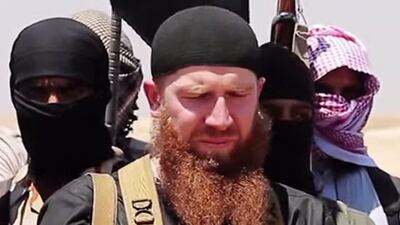BAGHDAD // A fierce, battle-hardened warlord with roots in Georgia and a thick red beard, Omar Al Shishani was one of the most notorious faces of the ISIL extremist group.
On Wednesday, the extremist-linked Amaq agency said Shishani was killed in the Iraqi town of Sharqat — details at odds with a previous announcement from the Pentagon that he died of wounds received in an air raid in Syria.
Shishani, whose nom de guerre meant Omar the Chechen, was one of the ISIL leaders most wanted by Washington which put a US$5 million (Dh18.36m) bounty on his head.
His exact rank was unclear, but a US official had termed him the “equivalent of the secretary of defence” for the radical group.
His death may disrupt the extremist group’s operations, a senior US military officer said on Thursday, while an Iraqi security expert said it could damage the group’s important recruitment efforts in ex-Soviet republics.
Hisham Al Hashimi, who advises Iraq’s government on armed groups, said Shishani had been wounded in the March attack but was treated at a hospital in Sharqat, an ISIL stronghold about 250km north of Baghdad.
He said Shishani was killed earlier this week in a nearby village along with an aide by an air raid during combat with US-backed Iraqi forces closing in on the area.
“[ISIL] lost something important: the charisma that he had to inspire and seduce Salafists from Chechnya, the Caucasus and Azerbaijan — the former Soviet republics,” Mr Al Hashimi said.
Asked about the potential impact, US army Lt Gen Sean MacFarland — commander of the US-led coalition battling ISIL — said it could disrupt the group’s operations if Shishani were indeed dead. “They would have to figure out who’s going to pick up his portfolio,” he said.
Shishani came from the Pankisi Gorge region that is populated mainly by ethnic Chechens.
He fought as a Chechen rebel against Russian forces before joining the Georgian military in 2006, and fought Russian forces again in Georgia in 2008.
He resurfaced in northern Syria in 2012 as the leader of a battalion of foreign fighters, according to Aymenn Al Tamimi, research fellow at the Middle East Forum, a US think tank.
As early as May 2013, when ISIL was just emerging in Syria, he was appointed the group’s military commander for the north of the country, Mr Al Tamimi said.
Richard Barrett of the US-based Soufan Group described Shishani as ISIL’s “most senior military commander” who had been in charge of key battles.
Shishani was not, however, a member of ISIL’s political leadership – a structure that is even murkier than its military command.
A profile of Shishani written by an ISIL supporter and posted online described him as “one of the best strategic and tactical leaders”.
He was born in 1986 to a Christian father and a Muslim mother, according to the text, which claimed he “never lost any of his battles”.
In an indication of Shishani’s popularity among sympathisers of ISIL, the text described him as “the new Khalid Ibn Al Walid” — a reference to a leader from the early days of Islam who played a crucial role in spreading the religion in Syria and Iraq.
* Agence France-Presse and Reuters

